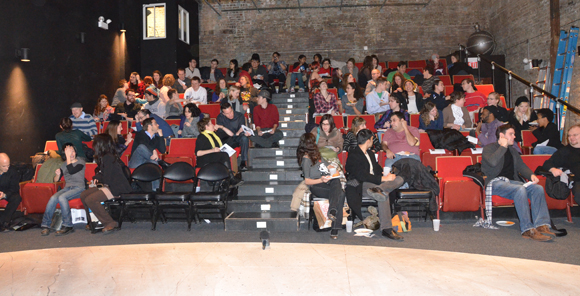These posts are adapted from the 20 minute lessons on story telling presented by Dan at the beginning of our Workshop! Workshop! show.
The other day, Kay was having a conversation with Dan during class. She brought up that they’d been in a closed workshop together. She said, “Last night I got to listen to a story at another round table of storytellers I sit in on. The person telling the story was clearly the hero of their story. They were playing chicken with their track team members in the gym. They were not supposed to be there. They had gotten in the carts that are supposed to collect all the dirty towels and were playing chicken. They were rolling their cart toward a wall of the gym and bailing out before crashing into the wall.”

She went on, “Of course they were very sympathetic to themselves.” The narrator was on their side, just as all the characters were on each other’s side.
But the narrator, looking back could have taken another route, “You know these idiots are dragging me along. I can’t believe that I let myself get talked into this! I’m not playing chicken. I was just in the cart. Now I’m the one that might crash!” Chicken should not be a team sport!
“If one were to flip that – you know there’s hostility toward his team mates because they got him into that mess – but also if he was going tell it from the perspective of the other kids they might frame it in a totally different way.”
She gave this example, “This kid he’s so focused on getting to State, you know he never lets loose! He never has any fun! I can’t believe he even decided to come play chicken with us. You know I’m surprised that he can even get his mind off of this run. A run he wanted to come do in the snow, mind you! Like we’re just ‘Let loose guy! Just let loose for a second!’”
As Walt Whitman is often misquoted, “Do I contradict myself? So be it, I contain multitudes.” You could see the narrator going with both these options. Both of these can be true at the same time. They were having fun together. They were a team. They all decided to ditch track practice to horse play with the carts and play chicken. And when you do stuff like that you often contradict yourself, you want to mess around, and you want to be studious and hard working. Just because there was one outcome, doesn’t mean you weren’t conflicted getting to that outcome.
So you as narrator get to play with those options.
One of the interesting things that also gets brought up with this discussion of shifting narratorial bias and perspective is that, as narrator, when you shift that focus you are allowed to jump into other people. Even though it’s a non-fiction personal story, you’re given leeway to let your imagination run. We as an audience give you room to play in the minds and bodies of other people. You were there, you know these people, you have some sense of what they were thinking at the time. As listeners we’re not going to get tripped up about with questions of, “Would you really know what was in that person’s head?” We take it as a given that this is your imagination, your assumption. Taking those chances to be like, “I’m gonna tell my story from a different character’s perspective” can be really fulfilling and an interesting way to play with story.
If you’re the kind of person who geeks out on storytelling, come check us out Monday 6pm. Twitch.tv/storyluck. Here’s the Facebook Invite if you prefer.


